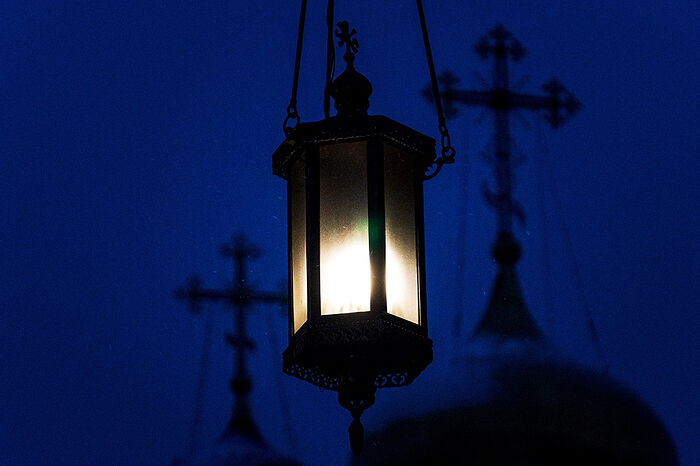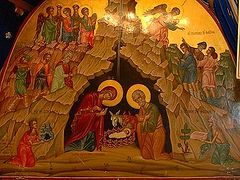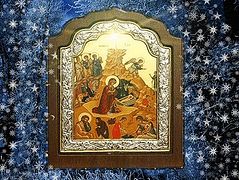We have entered upon the Nativity Fast. Let us attend! Fasting presupposes wakefulness and attention. First of all, note that being awake means fighting against sleep. Sleep is a state of rest, of lethargy, when our attention slackens. In the spiritual sense, sleep is the eternal rest, the rest of death. For a believer, being awake isn’t just not sleeping in the physical sense, but to fight in general against what lulls a man to sleep, preventing him from seeing what leads him to death.
What happened in ancient times, in the time of Noah, is no different from what we know about our own times. They were eating and drinking, marrying and giving in marriage (Mt. 24:38). How succinctly Christ describes human life! Thus, everyone lived day after day, and suddenly found themselves in the midst of a flood, in the abyss of insurmountable troubles. (This shouldn’t seem like an exaggeration, given that we’re now in the midst of global fear of a pandemic). Perhaps it’s no coincidence that the Lord identifies the spiritual state of these people with the words “eating and drinking?” It’s known that sleep seizes those who are satiated, but fasting and sobriety promote wakefulness.
The Church calls us to wakefulness! The Holy Fathers refer to the spiritual life as wakefulness. The ascetics of the desert had a monastery with a special name: “The Monastery of the Sleepless Ones.” The beginning of the spiritual life is defined by the Holy Fathers as awakening. Those who remember their first steps in faith understand how accurately this word signifies what is happening to us in this period. It is our exit from the state of sleep, touching the risen Christ, Who arose from the sleep of death. Awake thou that sleepest, and arise from the dead, and Christ shall give thee light (Eph. 5:14), the first Christians sang. This means that the Nativity Fast, as well as Great Lent, and all the Divine services of the year, contains the main mystery of the Christian faith—the Incarnation of God, in which the Cross and Resurrection are present from the very beginning. It’s not in vain that the feast of the Nativity of Christ is known as the three-day Pascha. And our spiritual work consists in following Christ God. By His gift we are called to come out of our sleep, to come out of the darkness, to come out of death. Do this, says the Apostle Paul, knowing the time, that now it is high time to awake out of sleep (Rom. 13:11). Sleep means disbelief in the victory of God—in the Resurrection. Maybe these people aren’t afraid, like those who laughed at the Apostle Paul in the Athenian Areopagus, when he began preaching about the Resurrection of Christ, saying: We will hear thee again of this matter—we’re going to wait for what will be tomorrow, or the day after, but not today.
In the Christian life, every day has infinite meaning. Time is given to us as an opportunity to partake of Christ’s crucified love, which the Gospels proclaim. Remember the words from the Song of Solomon, so often repeated by the Holy Fathers: I sleep, but my heart waketh (5:2). This is a description of the soul’s constant expectation of the coming of the beloved Heavenly Bridegroom. Or perhaps it’s like this with the soul: “I slept, but behold, I awoke,” because it hears its Beloved knocking. The awakening of the soul is connected with His coming and with the hope of soon hearing the word of Christ’s love.
During the Fast, we approach the Nativity of Christ, the coming of the Savior, the Pre-Eternal Word, Who is born as man. The Lord is near; He’s already knocking, and every soul seeking God can confirm: “I slept, but behold, I awoke.” The meaning of fasting is to prepare our hearts for the coming of the Lord, so He might be able to enter them by the Holy Spirit. To be awake means to stand guard over our hearts, to preserve them in any way possible, as the Holy Fathers say. If we don’t do this, bad feelings can settle into them: envy, anger, pride, impurity, and worse things. Each of us knows for himself how this happens, how we sometimes find ourselves defenseless before this world, which lies in evil. Wakefulness consists in the determination to confront these feelings as soon as they appear. Because there is a danger that an evil spirit will enter into us with them. This is the spiritual life; here are all its difficulties.
And so, when we try to pray, either in solitude or in church, resisting sin, we notice that precisely those recollections that we would like to be delivered from come to the surface from the depths of our hearts: arguments with this or that person, difficult relations in the family or at work. And it seems that what the Holy Scriptures or the Divine services offer us doesn’t answer the needs and daily problems for our existence. What should we do? Escape into this prayer, which seems to us distracted and detached from our real troubles, in order to forget what worries us?
But the Nativity Fast is wakefulness. During the Fast, the Church reveals to us the mystery of Christ in a special way. We should perceive our drawing near to His Nativity as the entrance of the Son of God into our lives, into our hearts, because He comes to meet each of us personally. The prophet of God Malachi prophesied that the LORD, Whom ye seek, shall suddenly come to His temple (Mal. 3:1). And the Apostle Paul clarifies: Know ye not that ye are the temple of God? (1 Cor. 3:16). We must prepare the way for Him Who is coming to us; we must open our lives to Him Who desires to make us His own dwelling, the sanctuary of God. It is along this path that the Lord, Whom we seek, will enter into us and abide in us.
Only in this way can we participate in the celebration of the mystery of the Nativity—and not just the Nativity of the Christ Child in Bethlehem, but the Nativity of God in mankind—the birth of Divine life in every one of us.
Is there a place for God in man? Will it be free when Christ God comes to us? The work of repentance, of the preservation of the heart, which we must take upon ourselves by fasting, has the sole purpose of preparing a dwelling for Him Who is coming, of making us temples of God. Only then will the root of evil be torn out of our lives, and with it all the poisonous shoots of rancor and impurity.
The Church will always remind us that we must pray more and read the Sacred Scriptures more during the Fast. The Holy Fathers call wakefulness the keeping of the word of God that we hear, the keeping of the commandments of God, and mindfulness of them. And we must, especially during this time, learn the practice of constant short prayer throughout the day—the Jesus Prayer or the Prayer of the Publican—each as much as he is able. Do we all know that every day, except Saturday and Sunday, the Church proposes to us the Seventeenth Kathisma, the 118th Psalm, which is read at a funeral or during the funeral Vigil? Isn’t it because the remembrance of death is the remembrance of the true, Paschal life—which Christ, Who was born in Bethlehem, brings to us? It’s good, the Holy Fathers say, for us to combine reading the Psalter with a brief invocation of the name of God. By the way, the Psalter is prayer in the midst of Sacred Scripture, a combination of the word of God and prayer. God says, and the Holy Fathers command us to unite the name of Jesus with our breath: My soul has slumbered for sorrow; strengthen Thou me with Thy words (Ps. 118:28); I have hidden Thine oracles in my heart, that I might not sin against Thee (118:11); I will meditate on Thy commandments, and consider Thy ways (118:15); Deal with Thy servant according to Thy mercy, and teach me Thine ordinances (118:124).
In other words, not just reading the Holy Scriptures, not just repeating the holy words of the prayers, but internally entering into what they contain. Consuming them, feeding upon them, because they are sweeter than honey, as says the Psalm. In them is the name of the Sweetest Jesus. The rest is in the mystery of God and the heart of every man who inwardly accepts the coming of Christ.




